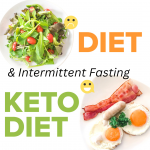Dr. Alain Delabos’ Chrononutrition is a method that respects the body’s biological clock and suggests that different nutrients are metabolized differently by the body depending on the time of the day. Here is a generalized example of his recommended daily eating schedule:
- Breakfast (within 30 minutes of waking up): This meal should be rich in fats and proteins to kick-start the body’s metabolism. An example breakfast might include cheese, whole grain bread, and a cup of coffee or tea. The goal is to provide the body with lipids and proteins that it would have spent during the night, thus preventing the body from taking from its reserves.
- Lunch (about 4.5 hours after breakfast): Lunch should consist mainly of complex carbohydrates and animal protein. This might be something like a lean meat or fish with a serving of pasta, rice, or potatoes. Avoid adding fats like oil or butter to your meal during this time, as the body is not in a state to metabolize it effectively.
- Snack (about 4.5 hours after lunch, optional): Dr. Delabos does not encourage snacking but if needed, a sweet snack is advised for the afternoon to cater to the body’s insulin peak. It could be a piece of fruit or a serving of dark chocolate.
- Dinner (about 2 hours before going to bed): This meal should be light, containing a lean protein and vegetables, like a chicken salad. The goal here is to avoid providing the body with energy that it would not use during sleep and would therefore store as fat.
This diet plan is a general approach based on Chrononutrition principles and might not suit everyone. Remember, it’s important to listen to your body’s signals of hunger and satiety, and to consult a healthcare provider before starting a new diet plan. Please note that the Chrononutrition method has not been universally adopted and its efficacy is still a matter of debate among nutritionists.











